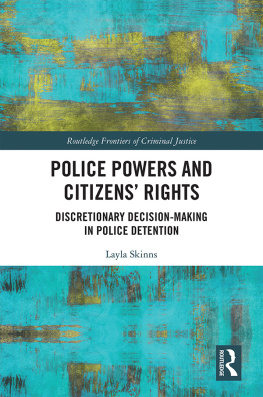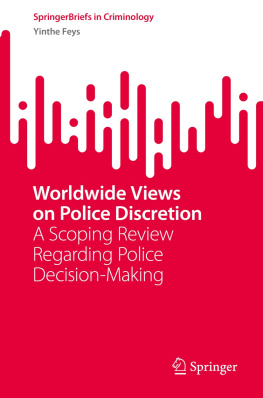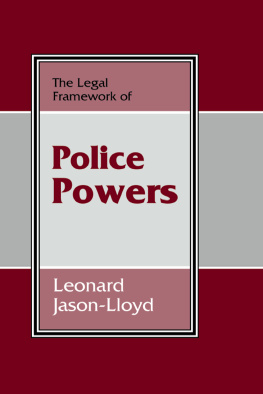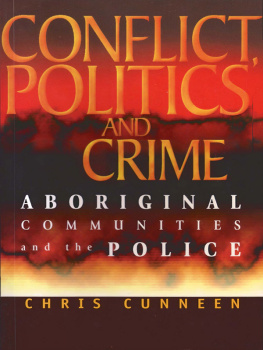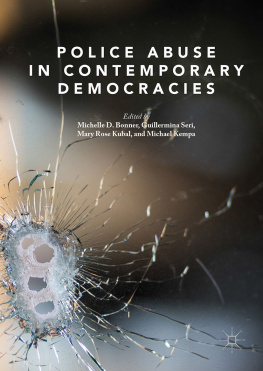Police Powers and Citizens Rights
Police detention is the place where suspects are taken whilst their case is investigated and a case disposal decision is reached. It is also a largely hidden, but vital, part of police work and an under-explored aspect of police studies. This book provides a much-needed comparative perspective on police detention. It examines variations in the relationship between police powers and citizens rights inside police detention in cities in four jurisdictions (in Australia, England, Ireland and the US), exploring in particular the relative influence of discretion, the law and other rule structures on police practices, as well as seeking to explain why these variations arise and what they reveal about state-citizen relations in neoliberal democracies.
This book draws on data collected in a multi-method study in five cities in Australia, England, Ireland and the US. This entailed 480 hours of observation, as well as 71 semi-structured interviews with police officers and detainees. Aside from filling in the gaps in the existing research, this book makes a significant contribution to debates about the links between police practices and neoliberalism. In particular, it examines the police, not just the prison, as a site of neoliberal governance.
By combining the empirical with the theoretical, the main themes of the book are likely to be of utmost importance to contemporary discussions about police work in increasingly unequal societies. As a result, it will also have a wide appeal to scholars and students, particularly in criminology and criminal justice.
Layla Skinns is a reader in criminology in the Centre for Criminological Research, University of Sheffield, having formerly worked and studied at the Institute of Criminology, University of Cambridge and the Institute for Criminal Policy Research, Kings College London. She has a long-standing interest in police and policing, in particular in how policing agents use their authority. A key focus of her research has been on police detention in England and Wales, but also in other parts of the anglophone world. In this setting, she is interested in police powers and their relationship with the law, police cultures and police discretion, and furthermore, how they impact on equality and state-citizen relations. She is also interested in how the public particularly detainees perceive the police, which links her research to discussions about police legitimacy and good policing.
Routledge Frontiers of Criminal Justice
Critical Perspectives on Coercive Interventions
Law, Medicine and Society
Edited by Claire Spivakovsky, Kate Seear and Adrian Carter
The Anthropology of Police
Edited by Kevin G. Karpiak and William Garriott
Criminal Justice and Regulation Revisited
Essays in Honour of Peter Grabosky
Edited by Lennon Y.C. Chang and Russell Brewer
The Pixelated Prisoner
Prison Video Links, Court Appearance and the Justice Matrix
Carolyn McKay
Prisoner Resettlement in Europe
Edited by Frieder Dnkel, Ineke Pruin, Anette Storgaard and Jonas Weber
Restoring Harm
A Psycho-Social Approach to Victims and Restorative Justice
Daniela Bolvar
Police Powers and Citizens Rights
Discretionary Decision-Making in Police Detention
Layla Skinns
For more information about this series, please visit: https://www.routledge.com/Routledge-Frontiers-of-Criminal-Justice/book-series/RFCJ
First published 2019
by Routledge
2 Park Square, Milton Park, Abingdon, Oxon OX14 4RN
and by Routledge
52 Vanderbilt Avenue, New York, NY 10017
Routledge is an imprint of the Taylor & Francis Group, an informa business
2019 Layla Skinns
The right of Layla Skinns to be identified as the author of this work has been asserted by her in accordance with sections 77 and 78 of the Copyright, Designs and Patents Act 1988.
All rights reserved. No part of this book may be reprinted or reproduced or utilised in any form or by any electronic, mechanical, or other means, now known or hereafter invented, including photocopying and recording, or in any information storage or retrieval system, without permission in writing from the publishers.
Trademark notice: Product or corporate names may be trademarks or registered trademarks, and are used only for identification and explanation without intent to infringe.
British Library Cataloguing-in-Publication Data
A catalogue record for this book is available from the British Library
Library of Congress Cataloging-in-Publication Data
Names: Skinns, Layla, author.
Title: Police powers and citizens rights: discretionary decision making in police detention / Layla Skinns.
Description: Abingdon, Oxon; New York, NY: Routledge, 2019.
Identifiers: LCCN 2018049160| ISBN 9780415642309 (hardback) | ISBN 9780203080979 (ebook)
Subjects: LCSH: Criminal justice, Administration of. | Detention of persons. | Police. | Civil rights.
Classification: LCC HV7419 .S585 2019 | DDC 363.2/3dc23
LC record available at https://lccn.loc.gov/2018049160
ISBN: 978-0-415-64230-9 (hbk)
ISBN: 978-0-203-08097-9 (ebk)
Typeset in Bembo
by codeMantra
For my parents, Laura and David Skinns, an important constant in my life.
The legal powers of the police are arguably their defining feature. The most influential and persuasive approach to defining the police was formulated nearly 50 years ago by Egon Bittner. Police are equipped, entitled and required to deal with every exigency in which force may have to be used (Bittner 1974: 35). They are the specialist repositories of that monopolisation of legitimate force in a territory which Max Weber analysed as the essence of a state.
In a recent sympathetic critique of this police-use-of-force paradigm, Jean-Paul Brodeur developed the concept in a variety of ways (Brodeur 2010: ). Crucially, he built upon a common observation about, and indeed a tenet of, effective policing. The use of force must be minimised to be legitimate, deployed only when absolutely necessary, and calibrated proportionately to the threat that justifies it. Identifying the police primarily through the use of legitimate force is misleading in that it postulates as their essence a capacity that is seldom actually resorted to. What marks the police out on a more regular basis is their endowment with a battery of special legal powers beyond those of the ordinary citizen, intended to enable them to maintain order and enforce substantive criminal law. These powers are of course all underpinned by the potential use of legitimate force, but this is relatively infrequently necessary.
The strongest of these legal powers is the ability to deprive people of their liberty, by arrest and its regular corollary, detention in the police station. In what purport to be democratic societies, the use of these powers is subject to some sort of legal constraints to safeguard citizens from unwarranted or unfair intrusions on their liberty. Thus, the topic of this remarkable book goes to the very heart of key issues concerning human rights, effective and fair government and social justice.
Dr Layla Skinns has become the leading authority on police custody in Britain since the publication in 2011 of her monograph

